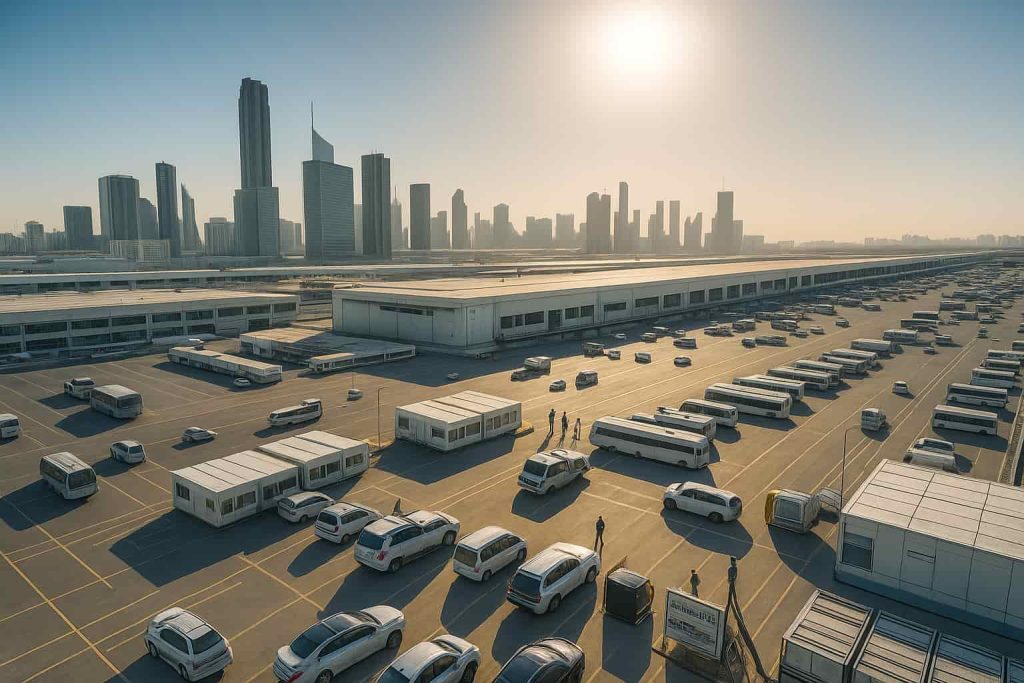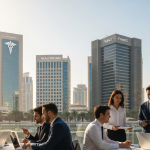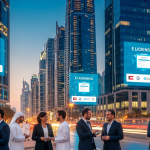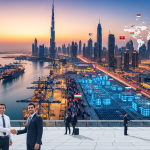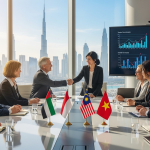Dubai’s Logistics Sector: A Hub of Innovation and Growth
Dubai has long been recognized as a global trade and logistics hub, strategically positioned at the crossroads of Europe, Asia, and Africa. In 2025, the emirate is taking significant strides to further solidify its position by integrating cutting-edge technologies and attracting substantial investments into its logistics sector. This growth is not only enhancing operational efficiencies but also creating new opportunities for businesses looking to establish or expand their presence in the region. As reported by Gulf News, recent developments in smart logistics and infrastructure upgrades are driving this transformation, positioning Dubai as a leader in the global supply chain ecosystem.
This article delves into the latest trends, technological advancements, and investment opportunities within Dubai’s logistics sector, offering insights for business leaders and investors. For those seeking expert guidance on navigating this dynamic market, Persian Horizon provides tailored solutions to help businesses capitalize on these emerging opportunities.
Technological Innovations Fueling Logistics Growth
One of the most significant drivers of growth in Dubai’s logistics sector is the adoption of advanced technologies. From artificial intelligence (AI) to blockchain and the Internet of Things (IoT), companies in Dubai are leveraging these tools to optimize supply chain operations. AI-powered predictive analytics are being used to forecast demand, reduce delivery times, and minimize operational costs. Meanwhile, blockchain technology is enhancing transparency and security in transactions, a critical factor in international trade.
Dubai’s government has played a pivotal role in fostering this technological shift. Initiatives such as the Dubai Smart City project and the Dubai Blockchain Strategy are creating an environment conducive to innovation. For instance, the use of autonomous vehicles and drones for last-mile delivery is gaining traction, with pilot projects already underway in key logistics zones like Jebel Ali Free Zone (JAFZA). These advancements are not only improving efficiency but also reducing the environmental footprint of logistics operations, aligning with Dubai’s sustainability goals for 2030.
Businesses looking to integrate these technologies into their operations can benefit from expert advice on market entry and setup. Explore more on how to establish a presence in this innovative sector through Business Setup Services offered by industry leaders in the UAE.
Investment Surge in Logistics Infrastructure
In addition to technological advancements, Dubai is witnessing a surge in investments aimed at expanding its logistics infrastructure. The emirate’s strategic location and world-class facilities, such as the Dubai World Central (DWC) and the Jebel Ali Port, continue to attract global players in the logistics and shipping industries. According to recent reports from Gulf News, billions of dirhams are being funneled into projects that enhance connectivity and capacity, including the expansion of Al Maktoum International Airport, set to become the world’s largest airport upon completion.
These infrastructure projects are complemented by the UAE’s robust trade agreements and free zone policies, which provide tax incentives and streamlined regulations for logistics firms. For investors, this presents a unique opportunity to tap into a market that is poised for exponential growth. Whether it’s warehousing, freight forwarding, or e-commerce logistics, the opportunities are vast. To stay updated on such investment trends, check out the latest insights on the News section of Persian Horizon’s platform.
Key Projects Driving Growth
Several flagship projects are at the forefront of Dubai’s logistics expansion:
- Al Maktoum International Airport Expansion: This multi-billion-dirham project aims to handle over 12 million tonnes of cargo annually, making it a central hub for global freight.
- Etihad Rail Network: Connecting Dubai with other emirates and the wider GCC region, this rail network is reducing transportation costs and transit times for goods.
- Dubai Logistics Corridor: A dedicated logistics corridor linking ports, airports, and free zones is streamlining the movement of goods across the emirate.
For those considering investments in such projects, detailed guidance is essential. Learn more about tailored Investment Consulting Services to make informed decisions in this rapidly evolving sector.
Impact on E-Commerce and Last-Mile Delivery
The rise of e-commerce has been a game-changer for Dubai’s logistics sector. With the UAE’s e-commerce market projected to reach new heights in 2025, driven by a tech-savvy population and high internet penetration, logistics companies are adapting to meet the growing demand for fast and reliable delivery services. Last-mile delivery, often the most challenging and costly aspect of the supply chain, is undergoing a transformation with the introduction of smart lockers, delivery drones, and electric vehicle fleets.
Global giants and local startups alike are investing heavily in this space, recognizing Dubai’s potential as a regional e-commerce hub. The government’s supportive policies, such as the Dubai CommerCity free zone dedicated to e-commerce businesses, are further accelerating this trend. Companies looking to advertise or sell within this booming market can explore Sales and Advertising Services to reach their target audience effectively.
Human Resources and Job Market Trends in Logistics
As the logistics sector expands, so does the demand for skilled professionals. From data analysts and AI specialists to supply chain managers and warehouse operators, the industry is creating thousands of jobs in Dubai. The UAE’s focus on Emiratisation is also evident in this sector, with over 152,000 Emiratis employed in private sector roles as of mid-2025, as reported by regional news sources. Logistics firms are increasingly prioritizing local talent while also attracting international expertise to meet specialized needs.
For businesses looking to recruit or expand their workforce in this field, understanding the local job market dynamics is crucial. Comprehensive insights and updates on HR trends can be found on the Blog section of Persian Horizon, offering valuable resources for employers and job seekers alike.
Regulatory Framework and Business Setup Opportunities
Dubai’s logistics sector benefits from a business-friendly regulatory environment. The Department of Economic Development (DED) and free zone authorities have introduced policies that simplify the process of setting up logistics companies. Whether it’s obtaining licenses for freight forwarding or establishing operations in a free zone like JAFZA, the process is streamlined to encourage foreign investment.
Moreover, the UAE’s strategic trade agreements with countries across Asia, Europe, and Africa provide logistics firms with access to a vast network of markets. Businesses looking to buy or sell existing logistics operations in Dubai can explore opportunities through Business Sales Services or Business Buying Services, ensuring a smooth transition and integration into the market.
Steps to Set Up a Logistics Business in Dubai
For entrepreneurs and investors eyeing the logistics sector, here are the key steps to establish a business in Dubai:
- Choose a Business Structure: Decide whether to operate in a free zone or mainland, each offering distinct advantages based on your business model.
- Obtain Necessary Licenses: Apply for a logistics or freight forwarding license through the DED or relevant free zone authority.
- Secure a Location: Select a strategic location near key infrastructure like ports or airports to optimize operations.
- Register for VAT: Ensure compliance with UAE’s VAT regulations, applicable to logistics services.
- Hire Skilled Staff: Build a team with expertise in supply chain management and emerging technologies.
For end-to-end assistance in navigating these steps, consider partnering with experts through Services designed to simplify business setup and operations in the UAE.
Gulf Region Trade and Partnerships
Dubai’s logistics sector is not only thriving domestically but also playing a crucial role in enhancing trade across the Gulf Cooperation Council (GCC) region. The completion of projects like the Etihad Rail is fostering seamless connectivity between the UAE, Saudi Arabia, and other GCC countries, reducing dependency on road transport and cutting costs for businesses. Additionally, Dubai’s participation in global trade expos and partnerships with international logistics firms is strengthening its position as a gateway to emerging markets.
For companies aiming to expand their footprint in the GCC, understanding regional trade dynamics is essential. Leveraging professional support for residency and visa processes can also facilitate smoother operations, available through Residency and Citizenship Services.
Challenges and Future Outlook
While the outlook for Dubai’s logistics sector is overwhelmingly positive, challenges remain. Rising operational costs, geopolitical tensions, and the need for continuous technological upgrades pose risks to businesses. However, Dubai’s proactive approach to addressing these issues—through government-backed initiatives and public-private partnerships—ensures that the sector remains resilient.
Looking ahead, the logistics industry in Dubai is expected to grow at an accelerated pace, driven by the emirate’s vision to become a global leader in smart and sustainable trade. With events like Expo 2025 on the horizon and the continued focus on digital transformation, the sector is set to attract even more foreign direct investment (FDI) and create a ripple effect across related industries.
Conclusion
Dubai’s logistics sector is undergoing a remarkable transformation in 2025, fueled by technological innovation, infrastructure investments, and a supportive regulatory framework. For businesses and investors, this presents a wealth of opportunities to tap into a market that is central to global trade. Whether you’re looking to set up a logistics firm, invest in infrastructure projects, or expand your operations in the GCC, Dubai offers a fertile ground for growth.
Navigating this complex landscape requires expertise and local knowledge. Platforms like Persian Horizon provide comprehensive support to ensure your business thrives in this dynamic environment. From investment consulting to business setup and beyond, the tools and insights you need are just a click away.
Source: Gulf News

